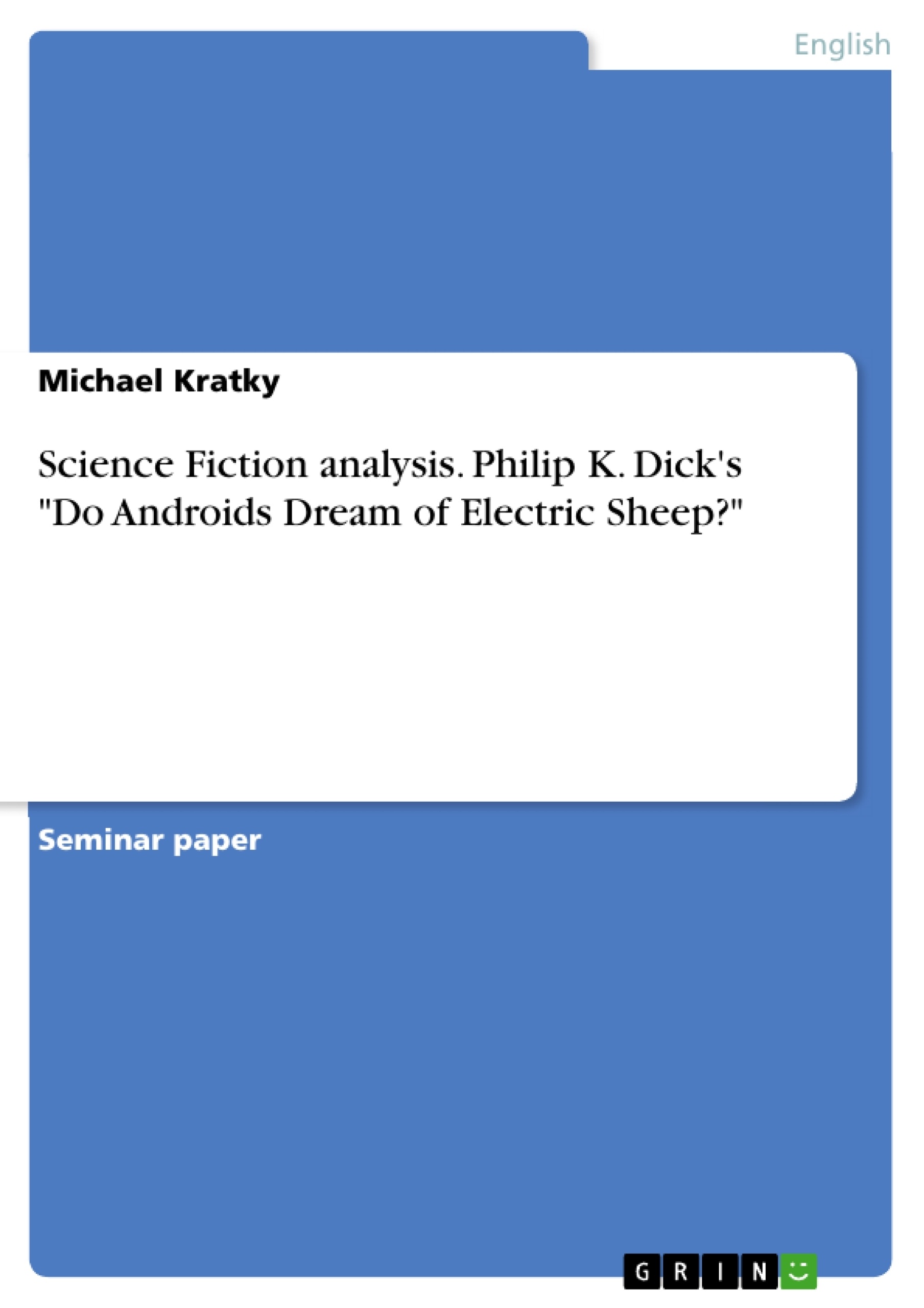“Do Androids Dream of Electric Sheep?” is one out of at least six novels by Philip K. Dick that deal substantially with the questions surrounding androids.
It is exactly the distortion between the real as the jumping-off point cited above and the hypothetical, unreal, fictional which creates a critical comment on the world the present reader lives in. The special focus on humanlike androids in “Do Androids Dream of Electric Sheep” implies a particular philosophical issue. Of course, the somewhat murky, obscure and intransparent depiction of androids involves the problem of man-machine relationships, which can to a certain extend be equated with human-android relationships. But Dick goes a step further, pointing out the differences as well as the parallels between both the android and the human being, using ambiguous descriptions and playing with the reader’s sympathy for both sides. One could even argue that Dick tried to create a kind of meeting halfway between man and android. Certainly, Dick himself faces difficulties when trying to define the android as “a thing somehow generated to deceive us in a cruel way, to cause us to think it to be one of ourselves.” This description meets exactly to core of our analysis, which deals with the impact and the effects created by this somewhat ambiguous representation of human and android life.
Table of Contents
- Introduction
- Concepts and back story
- Setting and Storyline
- Elements of the future world
- Hierarchies and discrimination
- The value of animals
- Human relationships and hierarchies
- The relationship humankind – technique
- The depiction of humans and androids
- Empathy and being human
- The ambiguity in the depiction of androids
- Conclusion
Objectives and Key Themes
This essay explores the philosophical issues raised in Philip K. Dick's novel "Do Androids Dream of Electric Sheep?" by analyzing the depiction of androids and their relationship to humanity in a post-apocalyptic future. It aims to understand how Dick's portrayal of androids challenges traditional conceptions of human identity and the meaning of empathy.
- The nature of humanity and androids in a post-apocalyptic world
- The role of empathy and its blurring boundaries in distinguishing between humans and androids
- The impact of technology on human identity and social hierarchies
- The ethical implications of androids and the nature of man-machine relationships
- The critical comment on society through the juxtaposition of reality and fiction in the novel's dystopian setting
Chapter Summaries
- The Introduction provides an overview of the novel's context within Philip K. Dick's work and science fiction literature. It highlights the novel's exploration of androids and the ambiguity of their representation, highlighting the core theme of blurring boundaries between humans and machines.
- Concepts and Back Story introduces the setting and storyline of "Do Androids Dream of Electric Sheep?". The novel's post-apocalyptic San Francisco, ravaged by nuclear war, is portrayed as a world struggling to survive. The importance of animals, both real and artificial, reflects the themes of empathy and the value of life. The storyline follows Rick Deckard, a bounty hunter tasked with "retiring" androids who have escaped from the off-world colonies.
- The chapter on Hierarchies and Discrimination delves into the social structure of the novel's world, exploring the value system that prioritizes owning real animals. It examines the power dynamics between humans and androids, highlighting the inherent discrimination against androids due to their artificial nature. The chapter also analyzes the impact of technology, specifically the Penfield mood organ, on human emotions and behavior.
- The chapter on The Depiction of Humans and Androids delves deeper into the ambiguity surrounding androids, exploring how Dick blurs the lines between human and artificial. It examines the concept of empathy and how it plays a crucial role in the novel's exploration of what it means to be human. The chapter analyzes Rick Deckard's evolving understanding of empathy as he encounters androids and grapples with the ethical implications of his role as a bounty hunter.
Keywords
The main keywords and focus topics of the work include androids, empathy, human identity, dystopian future, technology, man-machine relationships, ethical implications, and the blurring of boundaries between humans and machines.
Frequently Asked Questions
What is the main theme of Philip K. Dick's novel "Do Androids Dream of Electric Sheep?"
The novel explores the philosophical boundaries between humans and androids, focusing on empathy and the nature of identity in a post-apocalyptic world.
How does the novel define the difference between humans and androids?
The primary distinction is empathy; however, the novel blurs these lines by showing androids with human-like traits and humans who lack genuine connection.
What is the significance of animals in the story?
Owning a real animal is a major status symbol and a measure of a person's empathy. Artificial animals serve as substitutes in a world where nature has been devastated.
Who is Rick Deckard?
Rick Deckard is the protagonist and a bounty hunter whose job is to "retire" (kill) escaped androids that have fled to Earth from off-world colonies.
What are the "Penfield mood organs" mentioned in the analysis?
They are technological devices used by humans to artificially regulate their emotions, highlighting the impact of technology on human identity.
- Quote paper
- Michael Kratky (Author), 2006, Science Fiction analysis. Philip K. Dick's "Do Androids Dream of Electric Sheep?", Munich, GRIN Verlag, https://www.grin.com/document/69173



